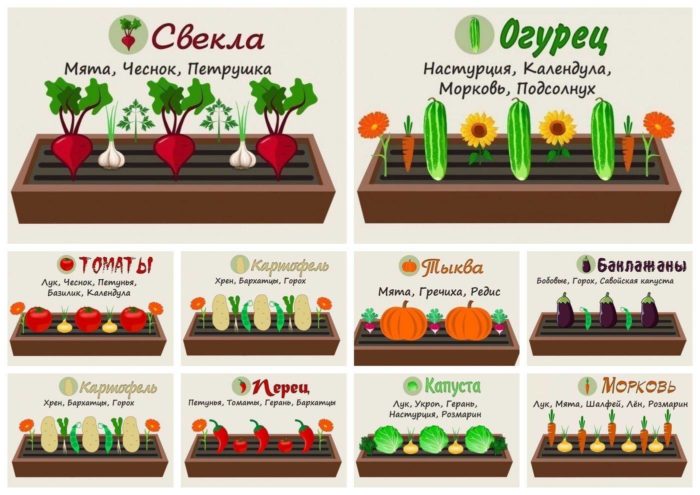Mixed planting of vegetables in the garden is practiced in almost all personal plots. Summer residents try to plant different plants in small quantities, rather than planting the entire garden with one type. In this case, it is necessary to focus on specific rules, taking into account compatibility and planting dates. So, what and how much to plant in the garden for the needs of the whole family?
[toc]
What to consider when planting
To get a good harvest in your garden, you need to take into account a number of important factors. In this case, you should focus on the following rules:
- Choose only those vegetables that are suitable for the climate of the region. So, it is useless to plant eggplants or bell peppers in the north. In such areas there is not enough heat and sun to grow such crops.
- Distribute the area rationally. In this case, it is worth giving preference to those crops that grow well in a particular type of soil.
- Don't plant too many vegetables. It is better to plant 10 pepper bushes and provide them with daily quality care. If you plant too many plants, the summer resident will become a hostage to his plot. In this case, he will have to spend a lot of effort and time.
- Apply fertilizers and prevent crop diseases. This will make it possible to collect the maximum harvest from a minimum area.
- Get rid of weeds in a timely manner. It creates extra shadow, which prevents vegetables and fruits from receiving the sun.
If the site is located in the shade most of the time, you should choose shade-tolerant varieties. With frequent exposure to direct sunlight, cucumbers and cabbage will have to be shaded. This is due to the fact that they are 90% liquid.
Table of vegetables for planting
To provide your family with vegetables, you need to take into account its composition. Specific norms for growing crops are presented in the table:
| Culture | Family of 2 | Family of 3 | Family of 4 | Family of 5 | Family of 6 |
| Onion | 1 kg | 1.5 kilograms | 2.5 kilograms | 3 kilograms | 4 kilograms |
| Tomatoes | 5-7 bushes | 10-15 bushes | 15-20 bushes | 20-25 bushes | 25-30 bushes |
| Cabbage | 10-20 bushes | 20-30 bushes | 30-40 bushes | 40-50 bushes | 50-60 bushes |
| Eggplant | 20-25 bushes | 25-30 bushes | 30-35 bushes | 35-50 bushes | 50-60 bushes |
| Carrot | 10-15 grams | 15-25 grams | 25-50 grams | 50-100 grams | 100-110 grams |
| cucumbers | 10-12 bushes | 12-20 bushes | 20-35 bushes | 30-50 bushes | 50-100 bushes |
| Beet | 7-10 grams | 10-15 grams | 15-25 grams | 20-35 grams | 35-50 grams |
| Potato | 10-12 kilograms | 15-30 kilograms | 35-50 kilograms | 50-65 kilograms | 50-75 kilograms |
| Beans | 50-60 pieces | 60-100 pieces | 100-150 pieces | 150-200 pieces | 180-250 pieces |
| Zucchini | 5-8 bushes | 5-10 bushes | 10-14 bushes | 10-15 bushes | 15-20 bushes |
The cultivation of vegetable crops is characterized by a number of features. When planting specific plants, it is certainly recommended to focus on the needs of each family. At the same time, there are average norms that help to approximately determine the number of crops to plant in the garden.













